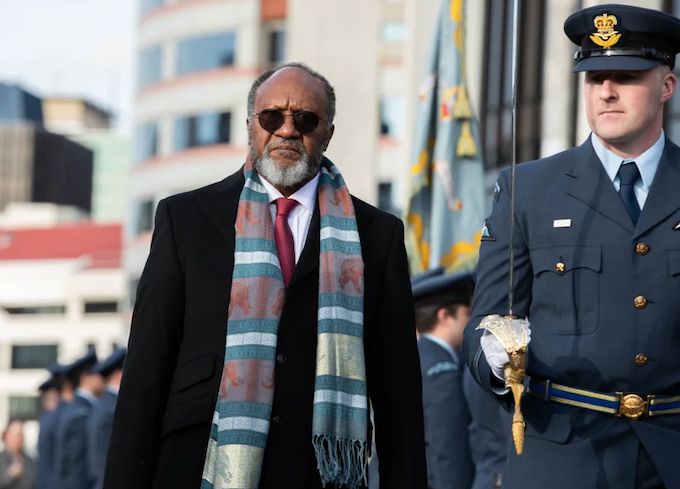
By Lydia Lewis, RNZ Pacific presenter/Bulletin editor
Vanuatu is leaning on Aotearoa’s medicinal cannabis production expertise in an effort to prop up its own market.
While the Melanesian nation has topped the Happy Planet Index list twice, as the happiest place in the world, it remains one of the most climate vulnerable states in the world.
Its topsy-turvy political landscape in the recent past has kept its citizens on the edge with prime ministers coming and going non-stop in 2023.
Prime Minister Charlot Salwai, who was elected as prime minister for the second time in October last year after his predecessor was voted out in a no-confidence vote, was in New Zealand for an official visit this week.
He stopped at Puro’s state-of-the-art cannabis cultivation facility in Kēkerengū on Tuesday, as part of his itinerary.
It has taken a while to kick Vanuatu’s 2018 medicinal cannabis legislation into motion, but Salwai is optimistic to get things moving for the economy.
New Zealand has a well-established medical cannabis industry with 40 companies in business since it was legalised in 2020.
Salwai said marijuana grew “easily” across Vanuatu.
‘Grows everywhere’
“[It] grows everywhere in the villages, but we don’t want to grow the wrong one, because it’s against the legislations.”
He said he found the visit to the cannabis farm “interesting”.
“They know about the benefits of this particular kind of marijuana,” he said.
“We need to invite the people who know about it, and the purpose of growing this marijuana is what is interesting to see.
“We invite them to come to Vanuatu and do a small-scale test to see and compare the quality of what we are producing here in Vanuatu, because here [New Zealand] it is seasonal while in Vanuatu it grows the whole year.
“It is good to compare the quality.”
He said Vanuatu is interested in granting medicinal cannabis production licences to those who know “the purpose of growing”.
Vanuatu PM Charlot Saiwai talks New Caledonia. Video: RNZ
Seasonal worker pits and peaks
In June, Luxon said he wanted to double — from 19,000 up to about 38,000 — the number of seasonal workers from its RSE programme participating countries, which include Vanuatu, Fiji, Solomon Islands, Papua New Guinea, Samoa, Tonga, Kiribati, Tuvalu, and Nauru.
There were approximately 47,800 Pacific Islanders that travelled to New Zealand or Australia for seasonal work in 2022-2023, under various labour mobility schemes, according to analysis by Australian academics Professor Paresh Narayan and Dr Bernard Njindan Iyke for 360info.
Vanuatu share of seasonal workers in New Zeeland was more than 5000 in 2022.
The Labour Commissioner Murielle Meltenoven warned at the time that the domestic labour market was concerned about “brain drain”.
Salwai has hinted at a possible internal review of Vanuatu’s seasonal worker programmes with Australia and New Zealand.
He wrapped up his tour of New Zealand with RSE workers, a focal point of discussions Luxon.
Responding to questions around whether his counterpart’s plans to double RSE numbers are realistic, he said: “We need to discuss it, not with New Zealand, but internally in Vanuatu.”
Small population
He said Vanuatu has a small population of only about 300,000 people, and doubling RSE workers to New Zealand would also affect the labour in his own country.
However, her acknowledged that the regional labour schemes were bringing in much needed remittance and assisting many families.
“[The RSE] provides access to their kids to go to school, have access to development, build new houses or doing business.
“What we [are] afraid of is what is happening even in the Pacific . . . even those who are well-educated are taking the same opportunity to look for jobs outside.”
New Zealand welcomes Vanuatu leader. Video: RNZ
Deep sea mining
Meanwhile, Vanuatu has been a vocal advocate against deep sea mining, has legislation which allow licences to be granted for deep sea mining exploration.
Salawai said Vanuatu sits on the rim of fire and there are environmental risks under the water.
“As a country, we need to know what is under and inside our waters” as well as “opportunity on our airspace”.
“We can allow license to do [deep sea] explorations, but to operate, it is another issue,” he said, adding “we don’t get what we [are] supposed to get on our airspace”.
‘We lose all the beauties of our islands’
More than a year on from twin cyclone disaster Judy and Kevin, Vanuatu is building back but not necessarily better.
Salwai said people whose homes were destroyed have been in limbo for what feels like a lifetime.
He said something that cannot be replaced is the land.
He said waves generated by the cyclones and sea level rise have destroyed beaches across Vanuatu:
“I am afraid that we lose all the beauties of our islands, but our kids, our children for tomorrow, won’t see it.
“Maybe, we will see it in the picture, but not in reality.”
This article is republished under a community partnership agreement with RNZ.








































